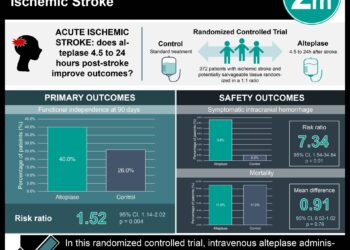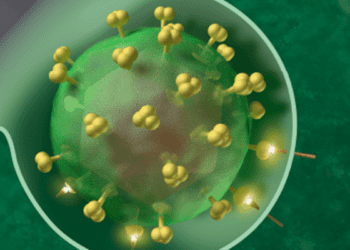Relationship between mean blood pressure and clinical outcome after acute ischemic stroke
1. This retrospective cohort study found a U-shaped relationship between mean SBP and 3-month functional outcome after acute ischemic stroke, with an optimal mean SBP of 135-150 mmHg
Evidence Rating Level: 2 (Good)
Elevated blood pressure (BP) is frequently observed in acute ischemic stroke (AIS), possibly as a compensatory mechanism to increase perfusion to ischemic brain areas. Excessive control of blood pressure in the acute stage of AIS is generally avoided because it may cause ischemic tissue hypoperfusion due to lowered blood flow. However, increased BP during AIS may exacerbate edema and hemorrhagic transformation of ischemic tissue. Therefore, controlling BP to an appropriate range is an important factor in AIS patients’ clinical outcomes. The objective of this retrospective cohort study was to analyze the relationship between mean BP and admission BP with clinical outcomes in patients with AIS. A cohort of 649 patients with ischemic stroke (median age 69, IQR 60-77) was identified using data from the stroke center of Jiangsu Province Hospital of Chinese Medicine between December 2020 and July 2021. The primary outcome was patient functional outcomes at 3 months post-stroke as measured by the modified Rankin Scale (mRS), with scores ≥3 defined as poor outcomes. The study found that in patients with AIS, admission SBP and mean SBP followed a U-curved relationship between functional prognosis. In other words, both extremes of BP were associated with poor outcomes. In a subgroup analysis, this relationship was equally present in both the acute (days 1-4) and subacute (>4 days) phases. Furthermore, when performing a logistical regression to control for antihypertensive treatment, the study conclusions remained unchanged. Overall, the optimal range of mean SBP was found to be 135 mmHg and 150 mmHg, with pressures above or below this range having higher median mRS scores and more deaths at 90 days as compared to patients within the range. Although this study is limited by its retrospective, single-center design, these findings suggest that early initiation of treatment for high BP may be more beneficial than conservatively delaying therapy until a specific time point after symptoms appear.
Click to read the study in BMC Neurology
Image: PD
©2023 2 Minute Medicine, Inc. All rights reserved. No works may be reproduced without expressed written consent from 2 Minute Medicine, Inc. Inquire about licensing here. No article should be construed as medical advice and is not intended as such by the authors or by 2 Minute Medicine, Inc.









